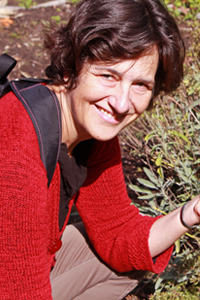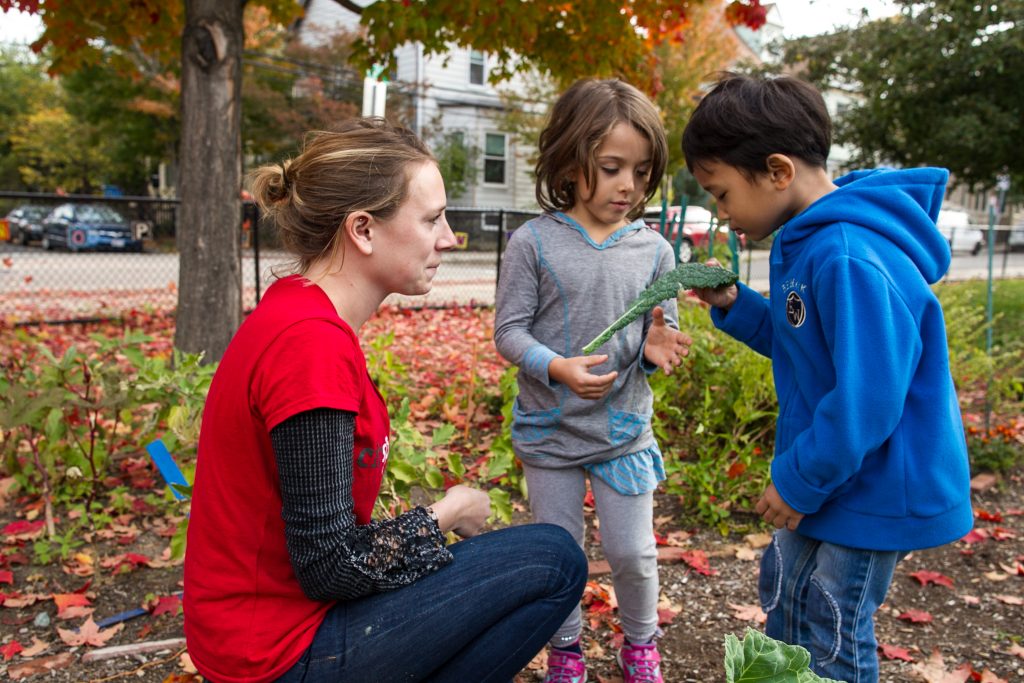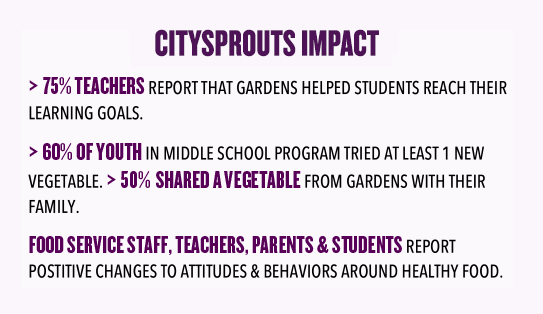Jane Hirschi
Boston’s School Garden Crusader
 TITLE: Executive Director at CitySprouts, Author of Ripe for Change: Garden-Based Learning in Schools
TITLE: Executive Director at CitySprouts, Author of Ripe for Change: Garden-Based Learning in Schools
LOCATION: Cambridge, Massachusetts
IMPACT: School gardens for more than 6,000 students & 225 teachers in 23 schools
In the late 1990s, Jane Hirschi’s daughter started kindergarten at a public school in Cambridge, Massachusetts. Jane was struck by the diversity of kids brought together in her daughter’s classroom. “I wanted to be a part of it,” she recalls. Equipped with a passion for kids and gardening, Jane had an idea for a school garden – and discovered that teachers were hungry for it. “Within a month,” Jane shares, “I had a cart that I was rolling through the halls with all these garden tools.” By 2001, her idea blossomed into CitySprouts, an organization dedicated to bringing school gardens to public schools.
Why school gardens? Because, like many schools in urban areas, public schools in Cambridge and Boston serve children from communities that often lack green spaces to dig and explore. “We want to reach kids who wouldn’t otherwise feel a connection to the earth, their food system and all the things you learn from growing food,” Jane offers.
“If we can ignite children’s curiosity about food systems and the environment, that’s a lifelong transformation.” – Jane Hirschi
CitySprouts takes its lead from the teacher. “I would see these math problems and writing samples on the wall, inspired by the gardens. I realized that I can bring the experience, but the teacher is going to turn this into a deeper learning opportunity,” Jane shares. School gardens are now part of a district-wide program in Cambridge and 8 public schools in Boston. CitySprouts dedicates 6 full-time garden coordinators to cover the 23 (and growing!) schools in their program. Each coordinator visits a school two days a week to help with garden planning and often co-teach to bring the garden-based curriculum to life. Their weekly presence at schools also helps ensure that the gardens are flourishing.

Students learning in the CitySprouts program
Teachers working with CitySprouts report positive impacts on students’ learning, their interest in food and their diets.
An expanding body of research bolsters those claims, showing that kids learn better through real world experiences and play. School gardens are perfect settings for this. “We want teachers to feel like they can’t teach without it,” says Jane. “It should be a requirement: we need a computer lab; we need a library; we need a school garden.” The City of Cambridge has committed to establishing dedicated garden spaces for all new schools built in the city.

CitySprouts recently started a tuition-free Middle School Program serving 175 youth through a summer program, after school clubs, and in-school electives. Its garden-based curriculum teaches kids to grow and prepare food, raises science and engineering proficiency and builds autonomy. Highlights for students include field trips to local Gaining Ground farm and the Greater Boston Food Bank where they prepare meals for others. It’s so popular they have to turn students away. “They want to learn how to grow food,” Jane offers, “and are looking for empowering life skills.”

Jane’s remaining goal? To bring school gardens to every school. “Kids are our future. If we can ignite children’s curiosity about food systems and the environment, that’s a lifelong transformation.”
Watch this video to see children and teachers speak about the difference that CitySprouts has made for them:
 Jane’s advice for parents looking to transform their kids’ learning environment:
Jane’s advice for parents looking to transform their kids’ learning environment:
Let Teachers Lead
- Don’t expect to do it on your own. Ultimately, schools must take ownership of a program for it to flourish.
- Teachers have a lot on their plates, but most really want school gardens. If they say “I can’t do that” or “it’s not possible,” use it as a springboard to problem solve. The trick is to discover how to make it work.
- Teachers may turn to you for suggestions on the curriculum, but let them lead. As Jane puts it, “Teachers have to feel like this is theirs. They won’t have the same passion for someone else’s curriculum.”
Partner, Partner, Partner!
- Get buy in from principals and appeal to them for funding. Building a garden only costs $300-$400, which is cheap compared to other expenses. Schools cover about 1/3rd of CitySprouts’ program costs.
- Consider how to keep the garden going year-round. Seek district staff support to maintain gardens or find volunteers at local colleges.
- School gardens bring communities together and garner support from surprising places. Jane has been able to secure corporate sponsors to put in a school garden, for example.
Don’t Reinvent the (garden) Wheel
- Many resources exist for newcomers to the school garden movement. Jane recommends Life Lab, which offers food-based and outdoor curricula & resources for smaller garden programs. And of course, check out her book Ripe for Change: Garden-Based Learning in Schools.
- Use familiar garden standbys, such as potatoes and carrots, and add unusual ones like eggplant or squash to expand kids’ palettes.
- Build an herb garden! Herbs are great because they will grow back after kids walk on them.
Individualize
- Tailor to a school’s specific needs. CitySprouts’ programs have a variety of models: some are more traditional, while others utilize pots and raised beds. One school is even establishing a rooftop garden!
- Consider a location where kids don’t run around. Can a class meet without traffic or safety issues? Is there sun and water?
![]()
Resources for Parents
Farm to School Field Guide for Parents
Growing Minds Recipes
Bring the farm back home with these recipes that highlight local, seasonal ingredients.
Click here to see a complete list of Farm to School resources.



